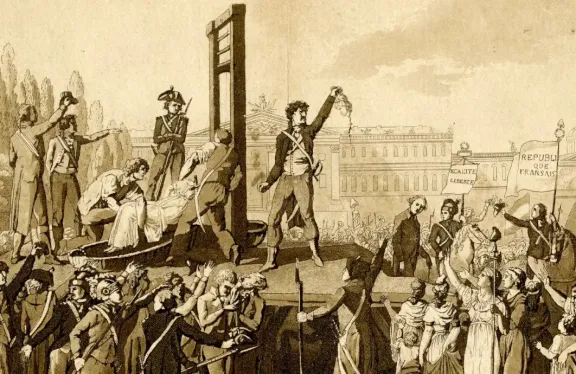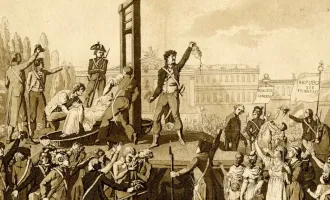
I Watched ‘Napoleon’ So You Don’t Have To
Marie Antoinette, former Queen of France, marches through the Place de la Revolution as onlookers jeer and throw vegetables that splatter satisfyingly across her face and clothes.
She climbs up the steps of a stage where a guillotine awaits and lets out soft cries amid the rancor of the crowd. In a blink of an eye, she loses 10 pounds via decapitation. The executioner proudly holds her head up in all its grotesque glory for everyone to see.
This enrapturing opening to “Napoleon” (2023) could have been a great setup for an amazing film. But like Marie Antoinette, the movie quickly loses its head. The shot ends by focusing on the future French General and Emperor, Napoleon Bonaparte, watching with a blank, almost uninterested expression — an expression that foreshadowed how I felt throughout the rest of the film’s runtime.
“Napoleon” plays Napoleon’s greatest hits with the grace of a high school textbook but without the factual accuracy or context. Because Napoleon lived an incredibly eventful life, there is a deluge of material to depict for a biopic. Rather than pick a single campaign or a specific aspect of his life, the filmmakers decided to cover almost everything including:
-1793 siege of Toulon
-His marriage to Josephine
-The Egypt campaign
-The fall of the French republic
-His coronation as emperor
-The battle of Austerlitz
-His divorce and remarriage to the Archduchess of Austria
-His invasion and withdrawal from Moscow
-His exile and return to France
-The death of his ex-wife Josephine
-The battle of Waterloo
-His exile to Saint Helen until his death in 1821
Because the film crammed all of this and more within two and a half hours, the pacing is atrocious. Most scenes barely feel a few minutes long before jumping to a different moment in history, sometimes years later, without conveying why that scene was worth showing.
Everything feels like a footnote — everything, that is, except for the battle of Austerlitz, the battle of Waterloo, and his ex-wife, which take a disproportionate amount of screen time.
At best, this makes the viewing disorienting, at worst, it gives a distorted and incomplete view of history. In one particularly egregious example, Napoleon invades Russia, is forced to retreat, and is subsequently exiled to Elba — a two-year timespan passing in what feels like thirty minutes.
The film does not depict the events that lead to Russia’s violation of the French blockade (which led to the French invasion of Russia), it omits the entire war of the 6th Coalition (which resulted from the botched invasion and retreat), and it ignores the multiple generous peace treaties Napoleon rejected before his defeat and exile.
While the bloody retreat from Russia was important, the film implies that it was the killing blow to Napoleon as opposed to the bloodying of the waters that encouraged the sharks of the 6th coalition to conquer France and ultimately depose Napoleon.
To compound the issues created by the incredibly compressed timeline, the movie seems to have a general disregard of truth as the movie is broadly inaccurate. Napoleon’s army did not shoot cannons at the Pyramid of Giza, Napoleon did not sink the Austrian and Prussian army by shooting at a frozen lake, and battles rarely show military formations.
All of this could be forgiven if the film had a throughline that characterized the star of the biopic. The musical “Hamilton” spans a similar time frame and a very broad range of seemingly unconnected eras in his life. However, the musical uses these eras to characterize Hamilton and provide themes of hardship and ambition, which makes the whole experience feel cohesive.
“Napoleon,” on the other hand, does not provide a compelling characterization. The way he is portrayed makes him look like a caricature of a horny pathetic nerd, with the emotional range and complexity of a cardboard box.
After seeing Joaquin Phoenix’s portrayal of Napoleon, I am convinced that he shouldn't be allowed to act ever again. His Napoleon had no charisma, an important quality considering nobody becomes a military emperor without being able to convince people to do stuff for you.
For example, after breaking his exile from Elba, Napoleon convinces the French 5th regiment that was sent to arrest him to instead join him and march against France. Phoenix portrays this by delivering a brief hackneyed speech with the same level of enthusiasm as reading one’s tax returns. If the real Napoleon had been that dull, I’m sure one of his soldiers would have shot him to spare France from suffering any more of his speeches.
Phoenix looked as bored throughout the film as I was watching it — a demeanor he maintained whether becoming the emperor of France, leading a battle, or even having sex.
The intimate scenes felt incredibly awkward, and dear God there was a lot of PG-13 sex. The relationship between Napoleon and Josephine (who becomes his empress and then ex-wife) is a focal point of the film.
But in the clumsy hands of Ridley Scott it felt like seeing an alien portraying what they think human affection looks like. When this limp Napoleon has the rare emotional outburst, it felt petulant rather than intimidating.
Even the color palette seemed bored, with a “historical drama” filter that made everything drab and gray. As the film went on, it somehow got greyer and more desaturated. If it had continued for thirty more minutes, I’m sure I would have been watching a dark blank screen.
Luckily, Napoleon does the audience a great service by dying before that could happen in a scene so amateurish I burst out laughing as the once Great Emperor of France literally falls over with the drama and gravitas of a roll of paper towels getting knocked over.
The kindest thing I could say about “Napoleon” is that with enough inebriation, scenes like this allow one to interpret the film as a decent parody of biopics.
All in all, watching the film made me wish I was guillotined alongside Marie Antoinette after the first scene.
If any reader is tempted to waste their time either watching it in theaters or on Apple TV, I would recommend instead watching the two-part YouTube video about Napoleon by Oversimplified. While the humor does not always land for me, it gives a more accurate and entertaining account of the life and death of the French emperor in half the time it takes to watch the film.
If YouTube videos aimed at a general audience are too low-brow for you, Napoleon is such a large historical figure that there is no lack of films, TV series, books, essays, and blogs dedicated to him that are better deserving of your attention than “Napoleon.”
Also, I know this is a small detail but it annoyed me to no end: all the French people had either an American or English accent rather than, you know, a French accent.
Oh, lastly, there is a Napoleon-is-short visual gag — it’s exactly as funny as you think it is.



